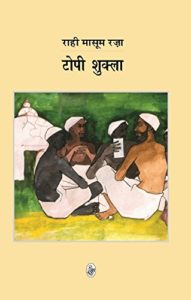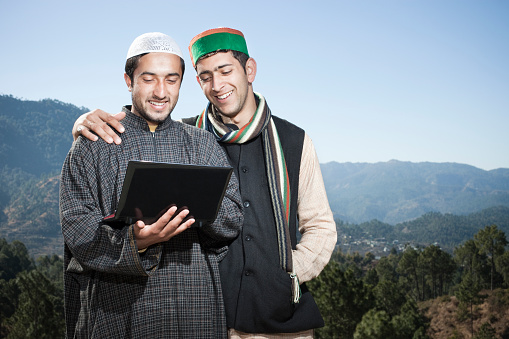Rahi Masoom Raza’s novel Topi Shukla is a tragic story of a man, representing a secular Indian imagination, who doesn’t compromise on his ideals. His life was a dark comedy of our time
“What is it, brother or sister?” an old lady servant asks. Six year old Topi Shukla curiously retorts, “why can’t it be a cycle”. She burst into laughter, everyone else whom she told that saleable story of Topi, laughed. But nobody realises that Topi needs a cycle, a genuine need of a kid.
Topi Shukla is a lead character in Rahi Masoom Raza’s eponymous masterpiece. A character, who was iconic because of his genuinity. Now an apt question might arise to the readers of this profile, why am I mentioning Topi Shukla now. What is newsy in his story which was published in 1969? First and foremost Topi is a timeless character, who has raised pertinent questions about everything, for example why can’t the third child of his parents be a cycle? Aren’t two enough?
Second, India lost to Pakistan for the first time in the Cricket World Cup, also the world cup. Some said, India lost because of the ill-will of fast bowler Mohammed Shami, these people questioned the loyalty of Indian Muslims. Topi has a Muslim best friend. Although Topi doesn’t watch cricket, he watches hockey. But he has a lot to do with this, because he wouldn’t like his best friend to be questioned for his loyalties. So, I think it is the right time to talk about Topi Shukla, aka Pandit Balbhadra Narayan Shukla. I will come to India’s defeat later, I want to first tell you who Topi Shukla was.
Topi was just a genuine human, who died of a heartbreak. Born and brought up in Banaras, Topi was ignored and humiliated by everyone. Topi’s life is not an example of some great secular mission, just because he had a muslim friend. Topi’s life is tragic. Topi lived his life in the time when there were no smartphones and 1.5 GB free data, despite that he was one of the biggest victims of rumours.
His name was associated with his friend Iffan’s wife Safina whom he loved as a sister. In Topi’s life Iffan, Safina and their daughter Sabnam were everything. When they were shifted to Jammu from Aligarh, he felt a huge void in life, which eventually took his life. He survives riots, heartbreak, humiliation, but not the separation from Iffan, Safina and Sabnam. Who else was his own?
Come to 2021. Topi died of suicide. Imagine everything now, people have 1.5 GB data in their phone. One more fact, Topi emerged as a hero of the riot days before he died by suicide. Because he, a Hindu, survives attacks by sharp weapons of a Muslim gangster.
Online mobs create a whatsApp forward — ‘Safina has killed Topi’. All TV reporters, digital, print Journalists are investigating this case. Some eyewitnesses also emerge. Who would tell various versions.
Safina first made Topi fall in love with him and then dumped him to die.
Topi was a great celibate Hindu, Safina couldn’t seduce him. So she first asked some gangster to kill him. When he survived that, she murdered him in their home. #Justicefortopi #Hindukhatremai hai is trending on Twitter. A very famous TV anchor sends his investigative team to the spot and finds out Safina and Iffan are linked to some terrorist organisation.
Those Journalists who tell that Topi died by suicide because of heartbreak, as his friend Iffan and Safina had to go to Jammu leaving Topi alone, are discarded. Some intellectuals who try to read between the lines say this is a Rashomon effect because nobody knows how and why Topi died. Everyone is drawing their own theory. Very few understand this term, but many of those who hear these intellectuals believe what they are saying.
But what about the truth? Who cares?
Safina and Iffan have locked themselves in their home. They couldn’t get time to wail on Topi’s death.

While when Topi was alive Topi’s friend Iffan and his wife also suffered a lot due to rumours. His job was threatened, so much so that later he had to flee to Jammu. Iffan sacrificed a lot for Topi and so did Safina — she didn’t even care about rumours of her illicit relation with Topi. Where do you find such selfless love for someone? And when he is dead, everyone is preying on Safina and Iffan. Isn’t it tragic?
Topi’s life is an important commentary on society’s predation on human life, Topi is genuine and does things that he believes are right but is detested by Hindu and Muslims alike. Nobody understands him. You need people like Rahi Masoom Raza to tell Topi’s story with sympathy, otherwise his story and life are merely appropriated for vested interests.
Nobody cares about Topi, when he is alive. Topi’s existence is equally threatened today as it was in the novel. Imagine Topi is a living character. A barrage of trolls, personal attacks on him for expressing his opinions and Calling a spade a spade without mincing words. He would have been in jail or murdered by someone or by himself (as happens in the novel).
I am not saying he did the right thing. Of course not! Suicide is not an answer. He had got the job offer, Iffan, Safina, and Sabnab were there for him. He could have continued to live. But he had to be martyred — authors often kill their characters to immortalise them, so Rahi Masoom Raza did the same. Even if he were alive, he won’t be able to do a job where he has to compromise. This was his nature.
When people question the loyalty of Muslims in the India-Pakistan match, Topi would consider it a complete injustice to the dream that India saw after Independence. He doesn’t hate Pakistan, and supports India, a rare breed. No? He talks about communalism in both Hindus and Muslims without a fear, he can even argue with Iffan on these topics.
Topi is not some totally idealistic character representing the idea of India. He is a brahmin. How can he eat in a Muslim household and he didn’t until he was in Aligarh for his higher education. Even then, he had no option otherwise he wouldn’t have eaten. In fact, his initial political beliefs were inspired by this idea that muslims are outsiders, who attacked India and they should go to Pakistan. Topi was inspired by Jan Sangh, later he became congressi, then communist, then just a cynic.
Topi’s life also reminds us that linguistic nationalism is stronger than religious nationalism. Which is why Bangladesh formed. Six-year-old Topi proposed to Iffan that we should exchange grandmothers with full conviction but unfortunately it couldn’t happen. Actually Topi found his grandmother Subhadra Devi’s language very strange — she was trained in Farsi because she was a single child of her father, who was a Farsi poet and taught her Farsi and Urdu. She used to scold Topi in this language. While Iffan’s grandmother spoke the language that Topi and his mother spoke.
Character of Topi’s grandmother also signifies that people who say Hindi is Hindu’s language and Urdu is Muslim’s doesn’t understand that language belongs to a region not religion. In the end, I would say that Topi’s biography needs to be read. Rahi Masoom Raza wrote a timeless character, his life now is more relevant than ever.
(Cover: Getty images)





